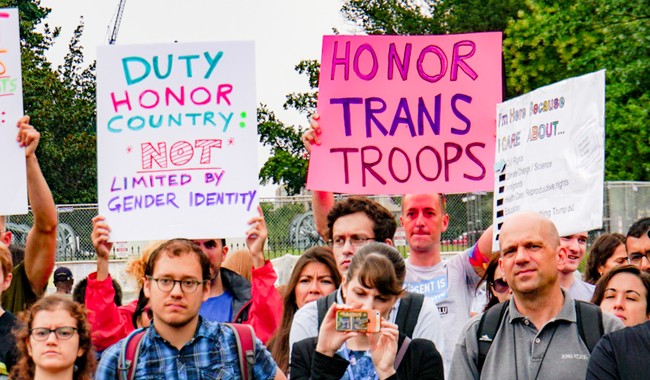

A new Pentagon policy will severely restrict the ability of so-called transgender members of the Armed Forces to avoid discharge by convincing a separation board to retain them on active duty. Under previous policy, transgenders identified for discharge could appeal to a separation board to overturn the administrative process. The new policy permits commanders to set aside the separation board recommendation and require discharge.
Advertisement
One of President Trump’s earliest acts was to issue an executive order titled Prioritizing Military Excellence and Readiness. This order revoked a Joe Biden, or perhaps an autopenned, executive order which had encouraged transgenders to join the military and protected those currently on duty; see Executive Order 14004—Enabling All Qualified Americans to Serve Their Country in Uniform. That, in turn, had revoked an memorandum issued by President Trump during his first term that barred transgenders from service; see Presidential Memorandum for the Secretary of Defense and the Secretary of Homeland Security Regarding Military Service by Transgender Individuals.
[Let me digress here for a moment to examine how the administrative process works under Republican versus Democrat administrations. Biden was able to revoke a Trump memo without issue. On the other hand, the memo written by Homeland Security Secretary Janet Napolitano that created the Deferred Action on Childhood Arrivals, or DACA/Dreamer, program has proved impervious to all attacks. Go figure.]
The current estimate is that about 4,200 transgenders haunt the ranks and about 1,000 of those have requested voluntary separation.
The previous policy permitted transgenders to take their case to a separation board composed of their peers and plead their case for retention. Under service regulations an officer called the “separation authority” can disapprove a recommendation for separation and direct retention a servicemember, separation authorities are not permitted to direct discharge if a board recommends retention. That board recommendation was, like the DACA memo, supposed to be more powerful than a lawful order from the commander-in-chief.
Advertisement
The new policy established by the Department of War Undersecretary for Personnel and Readiness, Anthony Tata, changes that. In fact, he even goes further than the reports. The separation board is only allowed to make findings on whether the individual has gender dysphoria. If they don’t have it, we can expect they will suffer the consequences. Undersecretary Tata’s memo says, “All boards will only make findings about whether a respondent has a diagnosis, history of, or exhibits symptoms consistent with gender dysphoria and, if so, that the respondent should be separated in accordance with reference (e).” This is a “heads I win, tails you lose” situation for anyone appearing before the board in hopes of salvaging their career. The authority to grant waivers to the policy is moved to the service secretaries.
Tata’s memo also lays out the rules of engagement for the conduct of separation boards.
In accordance with references (h) and (i), Service members may appear at all proceedings in person or virtually in accordance with applicable Military Department and Service policies and regulations. All Service members attending separation hearings, whether in person or virtually, must conform to the uniform and grooming standards associated with their sex in accordance with references (a) and (e). Waivers to permit civilian attire ora uniform not associated with a Service member’s sex will not be authorized or considered. Should the Servicemember not conform to uniform and grooming standards, board proceedings will continue with the Service member in absentia and may, as appropriate, take the Service member’s failure to comply with standards into consideration when determining whether the basis for separation has been established. While wear of the Service dress uniform is preferred, wear of the Uniform of the Day will not be adversely considered in any board decision.
Advertisement
They are not happy.
Logan Ireland, a master sergeant in the Air Force with 15 years of service, said he has been seen as a man for most of his adult life and for almost 13 years of his military service.
“It would be a betrayal of what the military has seen me as,” he said, adding that “it would be like a costume-like effect.”
Ireland, like almost all other transgender troops, is on administrative leave, and he is sporting a long beard.
“Can I put on a skirt or wear the female dress uniform? Sure, yes. … But does that reflect who I am and what I appear to be on a daily basis? No, and it just creates a lot of confusion,” he said.
Of course, there are attempts to use verbal jiujitsu on Secretary Hegseth.
[Emily Starbuck Gerson, a spokeswoman for SPARTA Pride, an advocacy group for transgender troops and veterans], says the new policy seems to run counter to the ideal of a merit-based military that Hegseth has touted.
“It does not account for the service member’s career history, accomplishments, training and the necessity to their field,” she said.
Ireland also noted that the policy “denies us the dignity and respect we were promised as we are forced out of a service that once honored our contributions.”
Whatever.
The Supreme Court green-lighted Trump’s policy in May; see Breaking: Supreme Court Hands Down Momentous Decision on Transgenders in the Military. Tata’s order seems designed to encourage as many voluntary separations as possible and create facts that will protect that Supreme Court victory as other challenges arise.
Advertisement
: The Schumer Shutdown is here. Rather than put the American people first, Chuck Schumer and the radical Democrats forced a government shutdown for healthcare for illegals. They own this. Help us continue to report the truth about the Schumer Shutdown. Use promo code POTUS47 to get 74% off your VIP membership.

